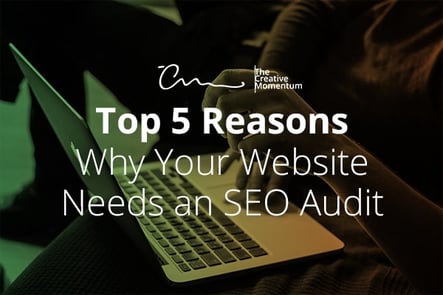
What is an SEO audit?
An SEO audit looks at a website and identifies its weaknesses. Now, I’m not talking about just aesthetics, because a website is much more than a beautiful mesh of colors and graphics. An SEO audit takes into account the totality of the website.
Here are the top 5 reasons why your website needs an SEO audit:
1. An SEO Audit Identifies Your Website’s Technical Issues
A good SEO audit helps identify technical SEO issues. Technical SEO relates to helping search engines better crawl your website. Search Engine Journal describes it as, “If you think of SEO like building a house, then technical SEO is all about building a solid foundation. You can look at it as any work done to a site aside from the content itself.”
Here are a few examples of Technical SEO elements that an audit identifies:
- Website Speed: How long does it take your website to load? Google takes into consideration your website load speed. Why? Because Google prioritizes UX over all things. A fast website typically means a good user experience. It’s a fact that the longer the website load time, the more likely your users will bounce. You can have the best content, but it is irrelevant if your users bounced out at 3 seconds. Some things that contribute to long load time are:
- Large Images
- Redundant javascript, css, or HTML code
- Server response time
- 301 Redirects, 302 Redirects, and 404 Errors: Redirects should be minimal and 404 errors should be non-existent on your site. Redirects, though minimal, can add to a slower user experience. 404 errors act as roadblocks to users. Do your best to fix these issues to provide a seamless user experience.
- Site Architecture & URL Structure: Your site should use subfolders to maintain a good site architecture and URLs should be short but descriptive. We won’t dive into site architecture here, but you can read more about how to help users seamlessly navigate your website here.
- Crawlability: Crawlability refers to how easily a search engine can crawl your website. You can ensure good crawlability by correctly using your robots.txt file, having a dynamic sitemap, and correctly using rel=noindex tags.
2. Identifies Your Website’s On-Page Issues
On-Page SEO refers to any optimizations that you can make to your content “easily.” We define easy as low-hanging fruit that is a relatively simple change to improve SEO.
An SEO audit will cover these elements:
- Meta Titles & Descriptions: Meta Titles should be anywhere between 35-70 characters and should include the keyword. Meta Descriptions should be under 160 characters, include the keyword, and include a CTA if relevant.
- Headers: I like to describe headers like headlines in the newspaper. The biggest headline tells you the most about the page. The H1 header works the same way. Make sure your H1 header is optimized to include the keyword.
- Content: Content will always be king. As far as SEO goes, make sure that your content is keyword centered. Don’t overstuff your content with keywords – you will be penalized for it. Make sure the keywords are natural and read well.
- Internal Linking: Help your users better navigate your site by inserting internal links.
3. Identifies Competition
Trying to build your online presence without looking at the competition is like trying to build the tallest skyscraper in the world but not knowing how tall the other skyscrapers are. It is essential that you identify your competition, but that’s not enough. You must also identify what your competition is doing. A good SEO audit will identify the competition, identify their strategy, and come up with a plan to build a taller skyscraper.
4. Identifies Your Backlinks
Backlinks are still a major part of Google’s algorithm in 2017 and I don’t see that changing anytime soon. The trend is typically the more reputable links you have to awesome content, the better your site ranks. If backlinks are so important, how come most people don’t know what domains are pointing back to their webpages? It is absolutely important to know where you stand. A good SEO audit answers these questions:
- How many backlinks does your website have?
- Does my website have spammy backlinks?
- How many backlinks does my competition have compared to me?
This being said, you should never pay for backlinks - focus on great content writing that will be resourceful and shareable. The backlinks should come naturally.
5. Helps You Build a Content Strategy
What do you do after you receive all of the data from reasons 1-4? Take everything you learned about your site’s technical SEO, On-Page SEO, competition, and backlinks; then use that data to come up with a content strategy.
Are you being out-ranked for your keywords? Take a look at your competition, beef up your content, optimize your meta title and descriptions, and figure out where you can make gains in backlinks. The SEO audit helps you stay focused with your content strategy.
Are you looking for an SEO audit of your website? Start a basic SEO audit now or Contact us for more information on a comprehensive SEO audit.


